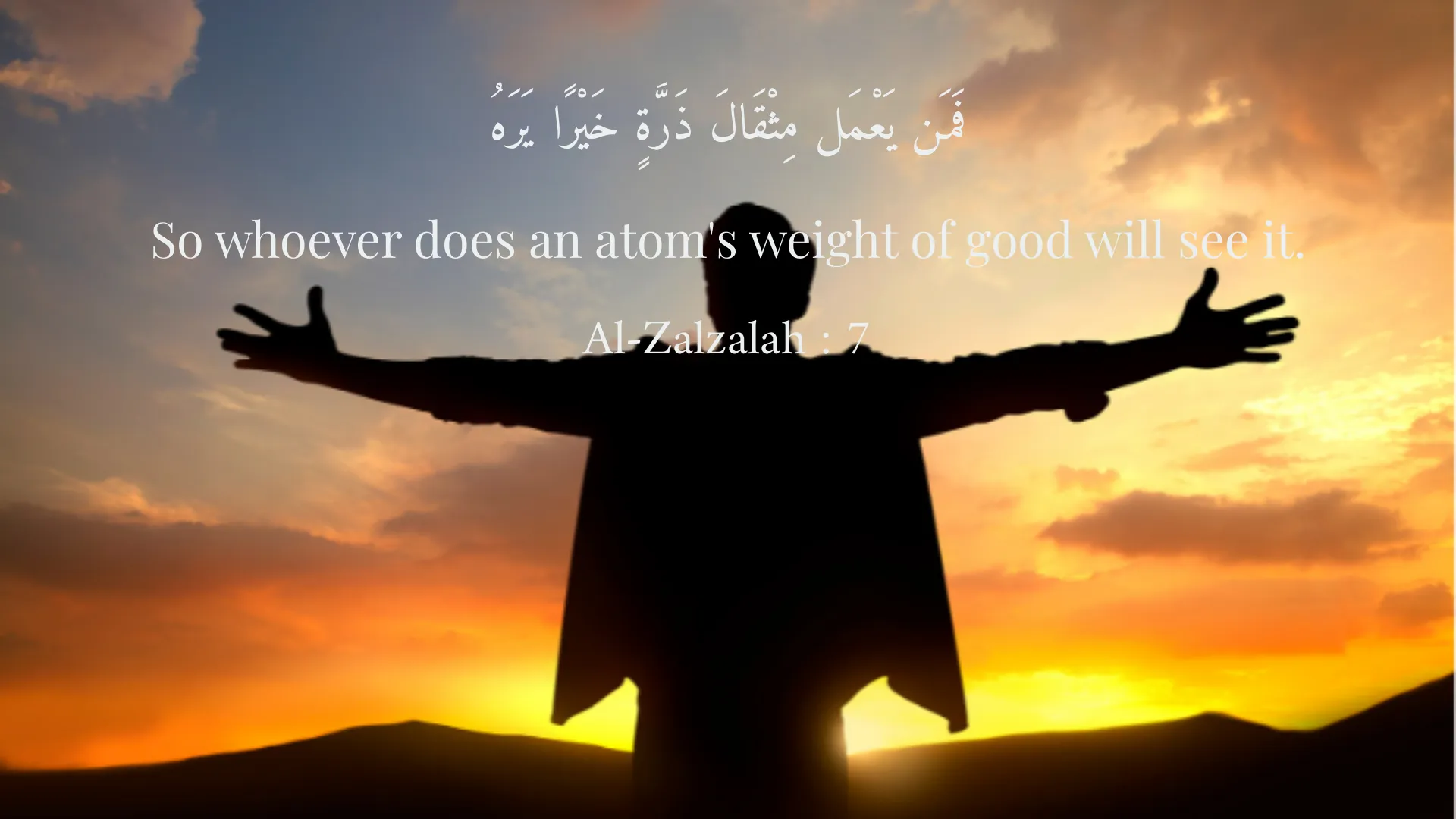Quranic Answer

In the Holy Quran, the significance of rewards for good deeds is vastly emphasized. This profound emphasis serves as a cornerstone of Islamic teachings, reinforcing the idea that every good action performed by an individual carries immense rewards, both in this life and the hereafter. The Quran articulates this theme in various verses, illustrating the spiritual and moral implications of performing good deeds. One pertinent example of this is found in Surah Al-Zalzalah, verse 7, where Allah states: 'So whoever does an atom's weight of good will see it.' This verse encapsulates the essence of accountability in the eyes of Allah, reminding believers that no act of kindness, however small, goes unnoticed. The notion that even the tiniest good deed has value is a compelling motivator for individuals to engage in positive actions consistently. The significance of this verse extends beyond mere acknowledgment of good deeds; it highlights that the rewards associated with them linger within the heart of the individual. Engaging in good actions contributes to an enriching inner experience, creating a unique sense of peace, satisfaction, and fulfillment. This internal reward—often more valuable than the external recognition of one's deeds—reinforces the spiritual notion that goodness breeds goodness. When individuals act selflessly, they not only contribute positively to society but also cultivate an inner tranquility that resonates within their souls. Furthermore, the impact of good deeds is not confined to the individual alone. It creates a ripple effect, inspiring others to follow suit. In a world often dominated by negativity and despair, the performance of good deeds acts as a beacon of light, illuminating the path for others. This collective elevation of society enhances the moral fabric of communities, fostering an environment where compassion and goodness prevail. Hence, the outcome of engaging in good actions transcends individual experience, resulting in a broader societal impact that aligns with the principles of communal harmony emphasized in Islam. Additionally, another critical verse that demonstrates the compensation for steadfastness in faith is in Surah Fussilat, verse 30: 'Indeed, those who have said, 'Our Lord is Allah' and then remained steadfast, the angels will descend upon them, [saying], 'Do not fear and do not grieve.' This particular verse emphasizes the deeper emotional and spiritual rewards that accompany good deeds and firm belief in Allah. It reassures believers that, in times of struggle or uncertainty, their good actions and steadfast faith will draw divine support and assurance. The reference to angels descending upon the faithful illustrates the protective and reassuring nature of good deeds, which not only fortify one's faith but dispel fear and anxiety. The angels’ comforting presence serves as a reminder of the profound connection between human actions and divine mercy. Good deeds lay the groundwork for a relationship with Allah that is filled with love, understanding, and protection. Those who remain resolute in their faith are not only rewarded in the hereafter but are also enveloped with an aura of divine reassurance in this life. This duality of rewards—spiritual comfort coupled with the greater chance of positive outcomes in their worldly affairs—encourages individuals to remain committed to their faith and act righteously. Moreover, the notion of good deeds leading to the satisfaction and inner peace of an individual cannot be overstated. In many instances, good actions act as a catalyst for personal growth and self-improvement. Such deeds instill a sense of purpose, belonging, and worth in the hearts of individuals. The fulfillment derived from helping others or performing acts of kindness ultimately leads to increased happiness and a stable mental state. This encourages a positive feedback loop, where the individual becomes more inclined to perform further good deeds, thus creating a virtuous cycle of positivity. In essence, the rewards of good deeds in the Islamic tradition serve as both a practical guide and a spiritual compass. The teachings from the Quran inspire individuals to reflect on their actions and motives, fostering a culture of accountability, kindness, and righteousness among Muslims. The recognition that every good deed, no matter how insignificant it may appear, carries with it a reward from Allah instills a profound sense of duty and commitment to moral conduct. As one contemplates the journey of self-improvement and moral excellence, the principles articulated in these Quranic verses illuminate the path toward Godliness. They serve as constant reminders that goodness is integral to one's faith and character. By being mindful of the rewards of good actions and striving for excellence, individuals not only enhance their relationship with Allah but also enrich their experiences on Earth. In conclusion, performing good deeds emerges as a multifaceted endeavor that encapsulates spiritual fulfillment, societal impact, and personal growth. The teachings of the Holy Quran underscore the significance of good actions and the myriad rewards they bring—both tangible and intangible. As believers embrace these principles and incorporate them into their lives, they embark on a transformative journey toward true peace, inner satisfaction, and lasting spiritual fulfillment. Ultimately, the essence lies in the understanding that engaging in good actions leads not only to worldly benefits but also secures divine blessings and proximity to Allah, fostering a life anchored in righteousness and spiritual harmony.
Related Verses
فَمَن يَعْمَل مِثْقَالَ ذَرَّةٍ خَيْرًا يَرَهُ
So whoever does an atom's weight of good will see it.
Al-Zalzalah : 7
إِنَّ الَّذِينَ قَالُوا رَبُّنَا اللَّهُ ثُمَّ اسْتَقَامُوا تَتَنَزَّلُ عَلَيْهِمُ الْمَلَائِكَةُ أَلَّا تَخَافُوا وَلَا تَحْزَنُوا
Indeed, those who have said, 'Our Lord is Allah' and then remained steadfast, the angels will descend upon them, [saying], 'Do not fear and do not grieve.'
Fussilat : 30
Short Story
One day, Adel felt a heaviness in his heart and didn’t know why. He recalled the verses of the Quran and decided to perform a good deed. By visiting an elderly care home and helping senior citizens, he not only made them happy, but also felt a profound sense of lightness and peace himself. This good deed brought new friendships into his life and filled his heart with light.